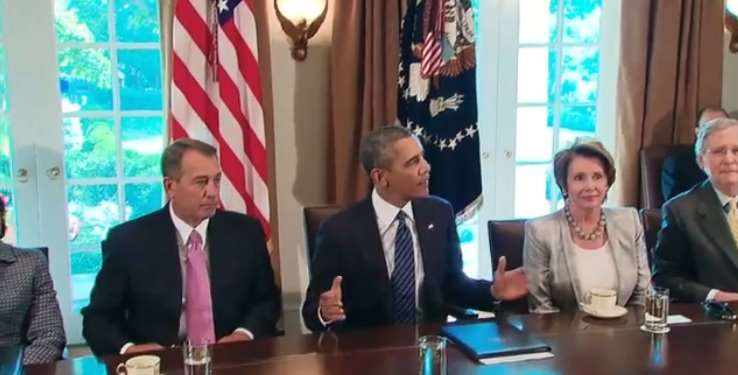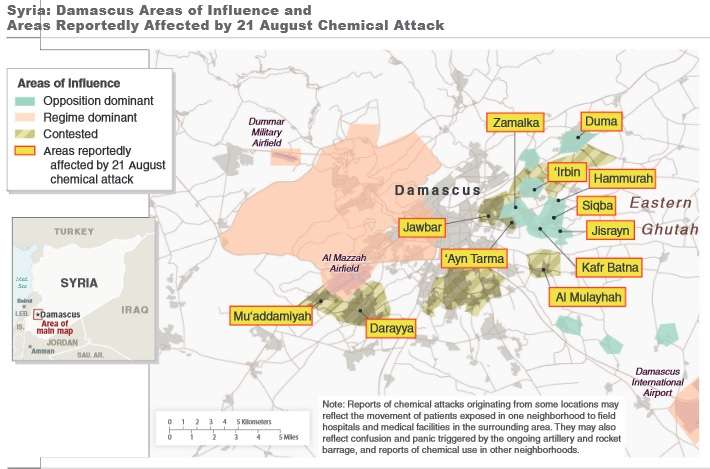The White House Markets a Syria War on the Web. Badly.

With proposals for military action against Syria sparking actual debate in Congress and drawing public support at levels that it would be charitable to call "tepid," the White House has turned to the sad necessity of winning hearts and minds. Logically enough, the Obama administration turned to the Internet, because who goes for direct marketing these days without a Website and videos? Unfortunately, the information devoted to Syria lays out powerful evidence that the Assad regime used chemical weapons against Syrians not firmly under its control, but doesn't explain how launching strikes against the country will improve the situation.
According to the Chemical Weapons Attack in Syria site's unclassified "Government Assessment of the Syrian Government's Use of Chemical Weapons on August 21, 2013":
A large body of independent sources indicates that a chemical weapons attack took place in the Damascus suburbs on August 21. In addition to U.S. intelligence information, there are accounts from international and Syrian medical personnel; videos; witness accounts; thousands of social media reports from at least 12 different locations in the Damascus area; journalist accounts; and reports from highly credible nongovernmental organizations.
A preliminary U.S. government assessment determined that 1,429 people were killed in the chemical weapons attack, including at least 426 children, though this assessment will certainly evolve as we obtain more information.
We assess with high confidence that the Syrian government carried out the chemical weapons attack against opposition elements in the Damascus suburbs on August 21. We assess that the scenario in which the opposition executed the attack on August 21 is highly unlikely. The body of information used to make this assessment includes intelligence pertaining to the regime's preparations for this attack and its means of delivery, multiple streams of intelligence about the attack itself and its effect, our post-attack observations, and the differences between the capabilities of the regime and the opposition. Our high confidence assessment is the strongest position that the U.S. Intelligence Community can take short of confirmation. We will continue to seek additional information to close gaps in our understanding of what took place.
The French government reached a similar conclusion regarding the use of chemical weapons by the Assad regime, and body count is horrifying. But it's not clear that being murdered with gas is worse than meeting a similar fate from bullets or explosives, and the United Nations estimates a total death count in the Syrian civil war of 100,000 so far. Millions have been displaced. There's no doubt that it's a brutal situation, and one that's not improving.

But the White House site doesn't address the larger picture of carnage beyond the use of this one type of weapon, nor does it present a goal other than the (implicit) end to the use of chemical weapons.
On September 1, President Obama laid out the case for a targeted military action against Syrian regime targets as a result of the Assad regime's use of chemical weapons that killed over one thousand people--including hundreds of children. The President also made clear that this would not be an open-ended intervention, and there will be no American troops on the ground. Instead, our action would be limited in duration and scope.
The President has put forward a proposed authorization that is focused on his clearly stated objectives – preventing and deterring the use and proliferation of chemical weapons within, to, or from Syria; degrading the Assad regime's capacity to carry out future chemical weapons attacks; and deterring this behavior in others – including Iran and Hizballah – who would otherwise feel emboldened to use such weapons.
While the President was clear on the need for action, he announced he would seek Congressional authorization for the use of force.
OK. So "our action would be limited in duration and scope" to make sure that Syrians die from bullets and shells instead of gas? That's the whole point?
The limited goal is probably deliberate, since there's no clear path to ending the Syrian civil war that culminates in an end to bloodshed and a relatively tolerable and tolerant regime in power that behaves better than the country's current rulers. There's not even a pretense of a path that involves "no American troops on the ground."
But there's no clear path to ending the use of chemical weapons with actions "limited in duration and scope" either. Maybe Assad's regime will stop using gas because we blow up a few bases, and maybe it won't. It's not something anybody should bet on.
And there are still all of those people dying from other kinds of weapons.
As an effort to persuade Americans that the Syrian regime is using chemical weapons, the White House site might be reasonably successful. But while arguing that the U.S. should so something in response, it doesn't even try to make the case that such action will improve the situation or be effective in any way.
If this is the best the White House can do, don't expect this latest marketing effort to shift the American public's overwhelming opposition to war.


Show Comments (52)